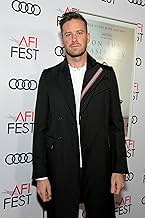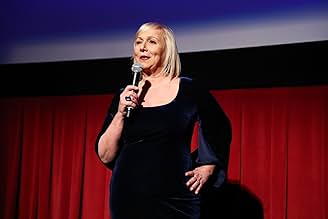L'histoire de Ruth Bader Ginsburg, ses luttes pour l'égalité des droits et ce qu'elle a dû surmonter pour devenir juge à la Cour suprême des États-Unis.L'histoire de Ruth Bader Ginsburg, ses luttes pour l'égalité des droits et ce qu'elle a dû surmonter pour devenir juge à la Cour suprême des États-Unis.L'histoire de Ruth Bader Ginsburg, ses luttes pour l'égalité des droits et ce qu'elle a dû surmonter pour devenir juge à la Cour suprême des États-Unis.
- Réalisation
- Scénario
- Casting principal
- Récompenses
- 4 victoires et 12 nominations au total
Francis X. McCarthy
- Judge Daugherty
- (as Francis Xavier McCarthy)
Avis à la une
Felicity Jones stars as Ruth Bader Ginsburg in this movie about how she came to argue a case in tax law and upturn two hundred years of Federal law and American culture about sexual stereotypes. Another reviewer says the movie is not political. I disagree. It is all political, from the opening scenes at Harvard Law, when the nine women in class are asked to justify their presence in place of nine similarly situated men, through the end, when she asks for justice. Times, she argues, have changed, and the law must change to reflect that. That change in attitudes may seem revolutionary, natural and proper in our society -- although there are still those who would deny it -- but the changes and arguments that led to those changes were purely political.
Director Mimi Leder directs this as a personal odyssey, and offers us characters living in the moment, from Armie Hammer cooking for his family to Justin Theroux and the ACLU lawyer who fights Mrs. Ginsburg over strategy and tactics. Central, of course, is Miss Jones as Mrs. Ginsburg. She is excellent, speaking in a muted Brooklyn accent that reminds me of my mother -- and which Mrs. Ginsburg did not use in her public appearances. It's hard to make history gripping, since we know how it came out. The movie succeeds because it offers us the inner turmoil of the people involved.
Director Mimi Leder directs this as a personal odyssey, and offers us characters living in the moment, from Armie Hammer cooking for his family to Justin Theroux and the ACLU lawyer who fights Mrs. Ginsburg over strategy and tactics. Central, of course, is Miss Jones as Mrs. Ginsburg. She is excellent, speaking in a muted Brooklyn accent that reminds me of my mother -- and which Mrs. Ginsburg did not use in her public appearances. It's hard to make history gripping, since we know how it came out. The movie succeeds because it offers us the inner turmoil of the people involved.
"Women have been losing the same argument for 100 years!" Ruth Bader Ginsberg (Felicity Jones)
Concerning sexual equality, the above quote best expresses the feisty young lawyer, RBG, and her early fight through the courts to overturn a tax code provision that discriminated against men. Thanks to her husband, Marty (Armie Hammer), who found a discriminatory clause in the code, she was able to fight on behalf of her client and therefore women in their ambition to be equal.
On the Basis of Sex is an entertaining and informative docudrama not only about her early days at Harvard Law and as a mother and professor, but also the daunting task women had of competing with men for professional jobs that were denied them uniformly and openly. To see RBG denied legal job after legal job is almost to feel the anxiety this top-of-her-class graduate endured in finally taking a job as a professor by default.
Her eventual success in the tax case came not in a Hollywood glamorous moment but slowly after grinding research and disappointments in the court room. Anyone in law school should see this carefully crafted drama for the truths it tells about the hard work it was for this diminutive battler. Helping Marty defeat cancer was just another battle the future Supreme Court Justice would fight and eventually win but not easily.
On the Basis of Sex is an old-fashioned courtroom drama about a judicial titan whose life is still inspiring as she approaches its end. "He's not going to take me seriously," she says in an early encounter with a judge. We know how that turns out for liberalism's "Obi Wan Kenobi."
Concerning sexual equality, the above quote best expresses the feisty young lawyer, RBG, and her early fight through the courts to overturn a tax code provision that discriminated against men. Thanks to her husband, Marty (Armie Hammer), who found a discriminatory clause in the code, she was able to fight on behalf of her client and therefore women in their ambition to be equal.
On the Basis of Sex is an entertaining and informative docudrama not only about her early days at Harvard Law and as a mother and professor, but also the daunting task women had of competing with men for professional jobs that were denied them uniformly and openly. To see RBG denied legal job after legal job is almost to feel the anxiety this top-of-her-class graduate endured in finally taking a job as a professor by default.
Her eventual success in the tax case came not in a Hollywood glamorous moment but slowly after grinding research and disappointments in the court room. Anyone in law school should see this carefully crafted drama for the truths it tells about the hard work it was for this diminutive battler. Helping Marty defeat cancer was just another battle the future Supreme Court Justice would fight and eventually win but not easily.
On the Basis of Sex is an old-fashioned courtroom drama about a judicial titan whose life is still inspiring as she approaches its end. "He's not going to take me seriously," she says in an early encounter with a judge. We know how that turns out for liberalism's "Obi Wan Kenobi."
From the impressive script to the tone this is a movie worth seeing.
A lot of movies I see these days fall short of the message they are trying to get across but this one definitely did not.
Ruth and her family done something incredible not just for America but the world. While this won't win any awards it's a history lesson in law which manages to make it exciting with some great performances.
A lot of movies I see these days fall short of the message they are trying to get across but this one definitely did not.
Ruth and her family done something incredible not just for America but the world. While this won't win any awards it's a history lesson in law which manages to make it exciting with some great performances.
My wife and I, both professionals about 15 years behind the real RBG, found this movie both fascinating and painful--almost as painful as the negative reviews that object to the Subject on the basis not of sex, but of politics. Too bad the knuckle-draggers can't get past their own biases to enjoy this very good and intellectually engaging movie. And yes, we did find it suspenceful. My wife, too got directed to the typing pool after four years of college and three of grad school, and I hope I was half as supportive as Marty. We thoroughly enjoyed this reminder that even today the arc of history doesn't bend itself, and that the only way to achieve your goals, especially (gasp) equality, is to keep pushing. And we thought the acting was first-rate, and loved the physical mismatch of the tiny Jones and towering Hammer.
The education and early career of U.S. Supreme Court Justice Ruth Bader Ginsburg, the first woman to sit on the highest court in America, is captured in this film. It stars Felicity Jones as the young woman who attended Harvard Law School with her husband (Armie Hammer) and went on to become one of the preeminent legal minds of her era.
The film centers on how Ginsburg was initially instrumental and ultimately essential in an appellate case that helped pave the way for gender discrimination in federal law being eradicated. Along with her husband, she worked on the appeal with the ACLU, heralded by Mel Wulf (Justin Theroux), a liberal with complicated principles. Kathy Bates makes a nice turn as a famous, hardened civil rights litigator who failed in some earlier cases. Sam Waterston is a welcome presence as the outwardly progressive but inwardly parochial Erwin Griswold, Dean of Harvard Law during Ginsburg's years as a student.
Jones shines in the role of the young Ginsburg, a dedicated, steadfast attorney who was undaunted by the entrenched views on gender in academia, the workplace and ultimately in the courts. She spends most of the film grappling with these challenges but all the while never letting go of her core principles and dedication to the law.
Although this film occasionally lurches into Oscar bait territory, it makes for a good portrayal of a woman who became a true pioneer in the history of gender equality and a good starting point to get to know Justice Ginsburg from where she started. Recommended.
The film centers on how Ginsburg was initially instrumental and ultimately essential in an appellate case that helped pave the way for gender discrimination in federal law being eradicated. Along with her husband, she worked on the appeal with the ACLU, heralded by Mel Wulf (Justin Theroux), a liberal with complicated principles. Kathy Bates makes a nice turn as a famous, hardened civil rights litigator who failed in some earlier cases. Sam Waterston is a welcome presence as the outwardly progressive but inwardly parochial Erwin Griswold, Dean of Harvard Law during Ginsburg's years as a student.
Jones shines in the role of the young Ginsburg, a dedicated, steadfast attorney who was undaunted by the entrenched views on gender in academia, the workplace and ultimately in the courts. She spends most of the film grappling with these challenges but all the while never letting go of her core principles and dedication to the law.
Although this film occasionally lurches into Oscar bait territory, it makes for a good portrayal of a woman who became a true pioneer in the history of gender equality and a good starting point to get to know Justice Ginsburg from where she started. Recommended.
Le saviez-vous
- AnecdotesDaniel Stiepleman - the writer of the film - is Ruth Bader Ginsburg's nephew.
- GaffesIn the ACLU office, Dorothy Kenyon tells Mel Wulf about a letter Abigail Adams wrote to John Adams in 1776 saying "As you write this new constitution, remember the ladies."
The Constitutional Convention happened in 1787. In 1776, John Adams was involved with writing the Declaration of Independence.
- Citations
Professor Freund: A court ought not be affected by the weather of the day, but will be by the climate of the era.
- Crédits fousThe closing credits include some "What happened to . . . " of the characters.
- ConnexionsFeatured in The IMDb Show: Take Five With Felicity Jones (2019)
- Bandes originalesTen Thousand Men of Harvard
Written by Alfred Putnam and Murray Taylor
Performed by the Harvard University Band and the Harvard Glee Club
By arrangement with the Harvard University Band and the Harvard Glee Club
Meilleurs choix
Connectez-vous pour évaluer et suivre la liste de favoris afin de recevoir des recommandations personnalisées
- How long is On the Basis of Sex?Alimenté par Alexa
Détails
- Date de sortie
- Pays d’origine
- Sites officiels
- Langue
- Aussi connu sous le nom de
- La voz de la igualdad
- Lieux de tournage
- 276 St-Jaques West, Old Montréal, Canada(Office scene with a young Ruth Bader Ginsburg)
- Sociétés de production
- Voir plus de crédits d'entreprise sur IMDbPro
Box-office
- Budget
- 20 000 000 $US (estimé)
- Montant brut aux États-Unis et au Canada
- 24 704 837 $US
- Week-end de sortie aux États-Unis et au Canada
- 686 355 $US
- 30 déc. 2018
- Montant brut mondial
- 38 755 968 $US
- Durée2 heures
- Couleur
- Mixage
- Rapport de forme
- 1.85 : 1
Contribuer à cette page
Suggérer une modification ou ajouter du contenu manquant

Lacune principale
What is the streaming release date of Une femme d'exception (2018) in Canada?
Répondre











































